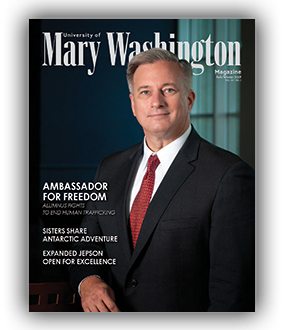
Mary Washington professors fueled Anthony Cammarato’s scientific curiosity. Now, he researches how age and disease affect heart function.
As head of a lab bearing his name at the Johns Hopkins University School of Medicine, Anthony Cammarato ’95 leads pioneering research in heart disease. But as a first-year at Mary Washington, he wasn’t sure how he was going to make it to graduation.
“I think I was quite poorly prepared for college,” Cammarato said. He’d attended a small high school in rural Delaware, which at that time “was not overly challenging.” As a result, he struggled in his early classes at Mary Washington and sensed he was well behind his peers.
His interest in science drew him to the biology department, where professors Janet Nicodemus-Hughes ’87, Rosemary Barra, Werner Wieland, and Steven Fuller were eager to help him adjust. Barra is still teaching, Nicodemus has since passed away, and Wieland and Fuller have retired with emeritus status.
“Those four really helped me figure out how to learn,” he said. “They helped hone my skills and get me up to speed. By the end of my second year, it had all clicked, and I started to do much better academically and personally.”
After graduating with honors, Cammarato went to Boston University School of Medicine, where he earned a Ph.D. in physiology and biophysics. He continued his postdoctoral studies in molecular genetics and cardiac functions at San Diego State University and later joined the staff at the nearby Sanford-Burnham Medical Research Institute. Today, he is an associate professor of medicine and physiology at Johns Hopkins.
It was in Barra’s genetics class at Mary Washington that he first encountered the fruit fly, which today plays a critical role in his research into cardiac muscle and how age and disease affect its function. Although the drosophila heart is vastly different from the human heart at the organ level, they are nearly identical at the molecular level, which enables Cammarato and his team to manipulate genes to search for ways to address heart disease.
Cammarato’s lab is working on several proprietary compounds that might help thwart heart disease. “We haven’t identified anything that has been a wonder drug or anything like that,” he said, “but we definitely see responses that are quite promising.”
The work is fun and fulfilling. “I’m totally ecstatic to be where I am. I love getting up and going to the lab every day,” he said. “I consider myself blessed and very fortunate to be in the position that I’m in and to do one of the things I knew I wanted to do from the time I was 18 years old.”
He credits his college days in Fredericksburg with much of his success. “I think and remember fondly back to Mary Washington and really how that all got it going – the faculty members who really stood by my side and helped me grow and taught me how to be a scientist, how to read and understand this material in a way that I previously hadn’t,” he said. “I still to this day rely on a lot of what I learned 25 years ago when I was at Mary Washington.”
